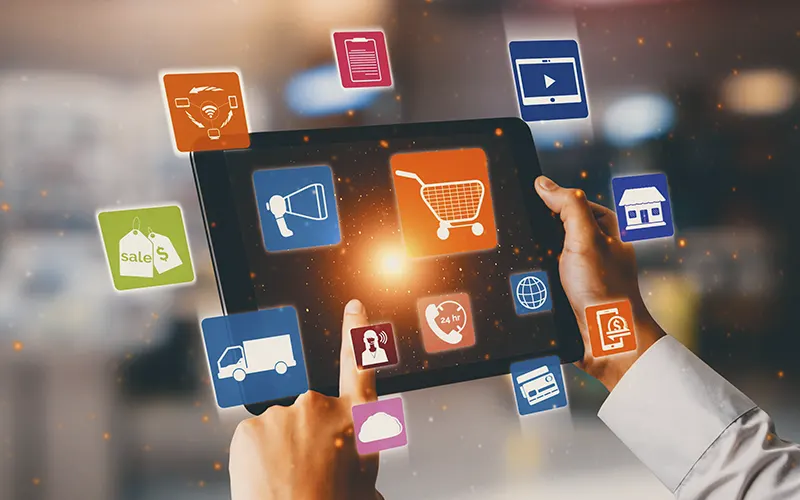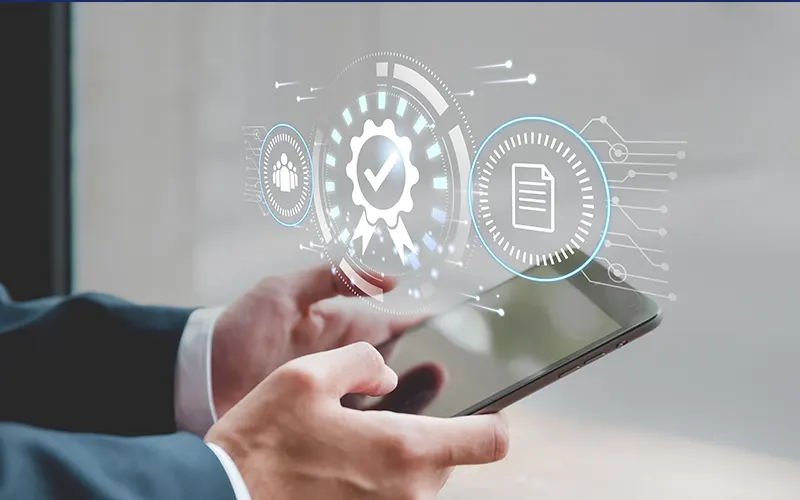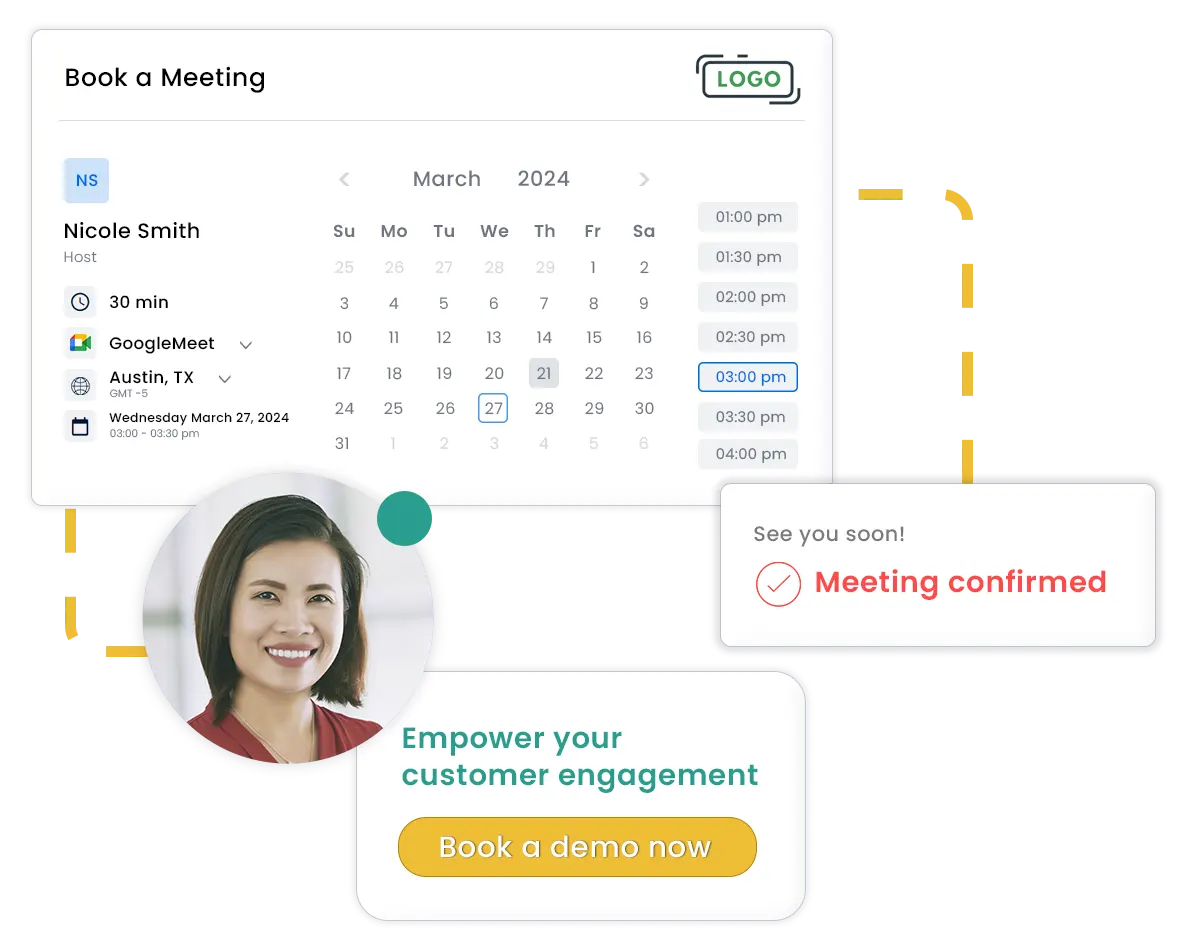Your brand surely has some sort of online customer interaction. Artificial Intelligence (AI) can make those interactions faster, easier, and more convenient for both your team and clients. In our post, we’re featuring 12 inspiring real-world AI customer experience examples, along with takeaways you can apply to your strategy.
Key Takeaways
- AI-driven customer experiences like conversational chatbots, AI customer engagement software, and recommendation engines help companies answer questions faster, book appointments without back-and-forth, and suggest the right actions at the right time.
- AI takes over repetitive tasks—like checking availability or answering FAQs—so customers get help instantly, even outside business hours.
- Companies using AI in customer support & service are cutting costs by 20–30%, and those with existing automation can let AI handle up to half of all requests without needing a human.
- From tech giants like Salesforce, HubSpot, and Zoom to healthcare providers, governments, and nonprofits, real-world examples show that AI makes service faster for users and more manageable for teams.
Best Examples of AI Customer Experiences in Action
AI experiences are not just science fiction predictions anymore—businesses across all sectors are actively using them showing measurable impacts. Companies that use AI for customer service are cutting their support costs by 20–30%. And if they already have some automation in place, AI could handle up to half of all customer requests — meaning even fewer calls or chats need a real person.
From 24/7 AI chatbots, smart self-service portals, and virtual assistants to predictive analytics, AI-driven customer experiences have penetrated our lives. AI brings better service, streamlined communication, and takes care of the boring stuff — things we couldn’t even imagine automating years ago.
Here are the most impressive AI customer experience examples implemented by leading companies and organizations across SaaS, retail, healthcare, education, and beyond.
1. Salesforce Einstein: The AI CRM Sidekick
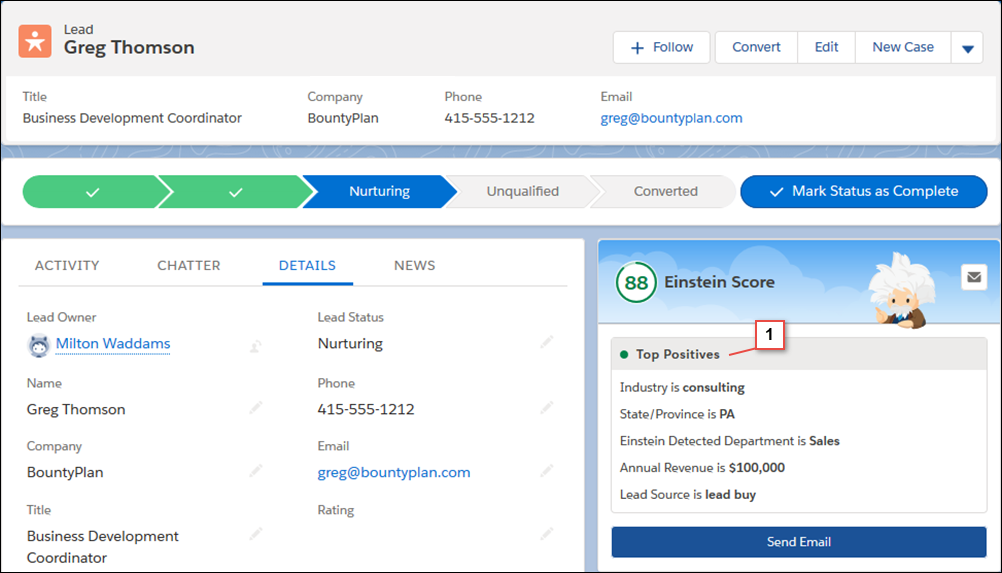
Salesforce has always been a pioneer in technology adoption. In 2016, the platform launched Salesforce Einstein, an integrated suite of tools that enables an AI-driven sales and marketing experience within the Salesforce CRM.
Under the hood, it uses machine learning, natural language processing (NLP), and predictive analytics. Combined, these technologies help sales and marketing teams rank leads, suggest the best times to reach out, and even write emails.
As an example, the Einstein Lead Scoring tool lets you evaluate your leads based on their behavior, interaction track record, and general customer profile data, so you can focus your efforts on the most promising leads.
How AI Impacts Sales Team Experience
Sales teams that have been using it for some time report a 25% boost in sales conversion. AI improves Salesforce teams’ productivity and helps target the right prospects, rather than scattering efforts on someone who’ll never converts.
Empower Your Salesforce Teams with an AI-Powered Sales Assistant
2. HubSpot: AI Email Suggestions + Meeting Booking
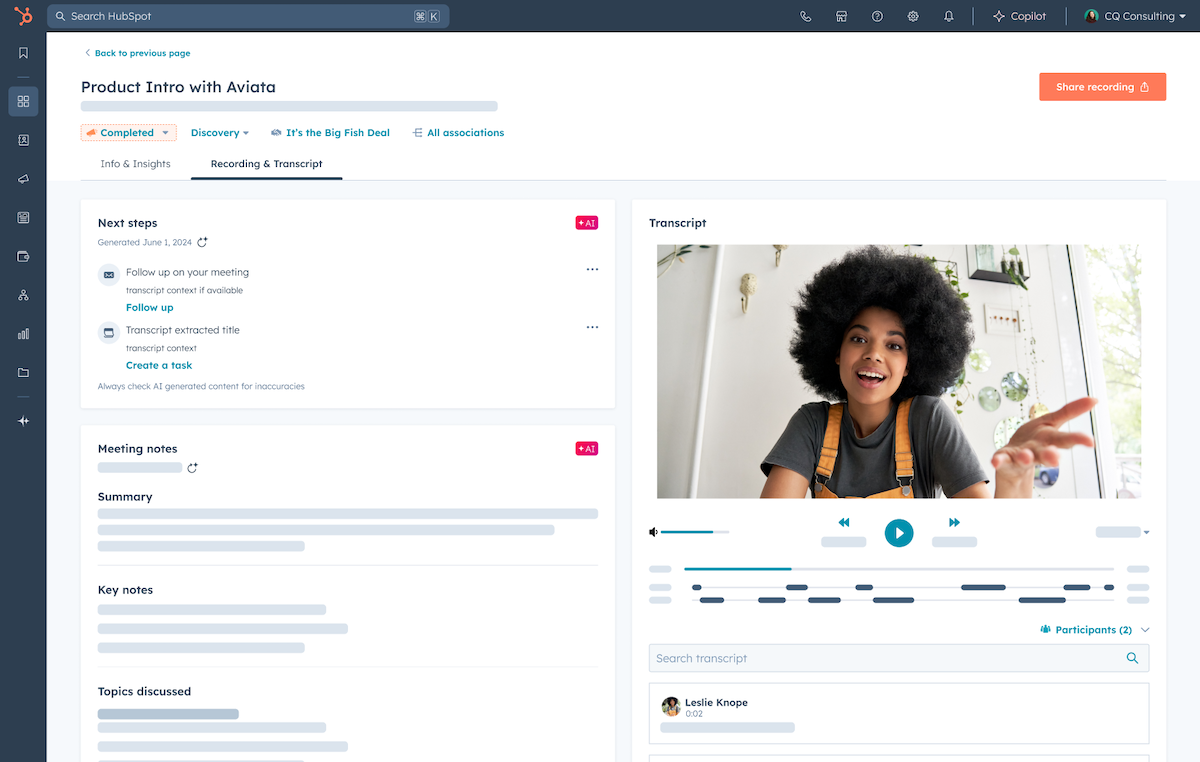
If you’re on the HubSpot CRM, you may already be unconsciously using its first AI tools for content writing and CRM reporting tasks which has been around for 2 years. With the help of AI, HubSpot can white your personalized email replies that are content-aware and include smart meeting links if your prospect is close to purchase. You can also share calendar links that are personalized to the recipient’s behavior and lifecycle stage.
How AI Impacts Marketing Team Experience
The company has no plans to stop scaling its AI adoption. In April 2025, HubSpot announced its new AI tool suite, Breeze. It automates customer support with 24/7 agents and personalizes marketing outreach with real-time account research, all integrated across their platform.
3. Zoom: AI For Meeting Summaries & Action Items
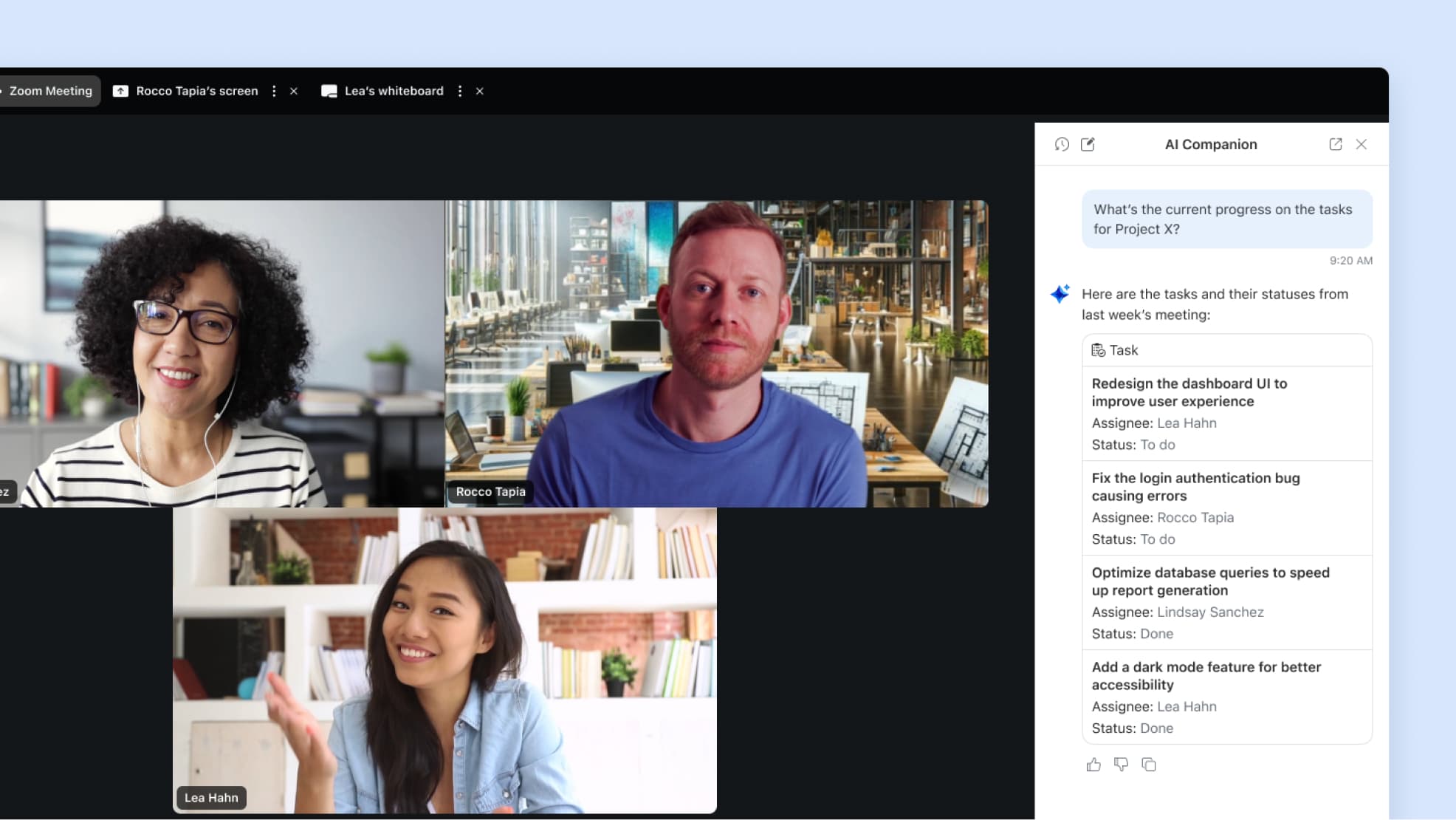
Zoom launched its AI Companion in 2023. Like other AI meeting note-takers, it transcribes your meeting summaries, lists key actions, and highlights major discussion points. Only now, you don’t need any connectors, so there’s less friction and better data management. If you communicate with customers via Zoom or use it internally, you can just follow the meeting without manually taking notes on paper.
How AI Impacts Meeting Experience
Zoom reported that 74% of leaders say AI saves them one or more hours a day on meeting tasks like messages, emails, and follow-ups. Now, teams can stay focused on the conversion while AI ensures nothing important is missed.
Turn Conversations Into Conversions with SUMO’s AI Meeting Assistant
4. Lightspeed + Intercom’s Fin Agent: AI For Customer Support
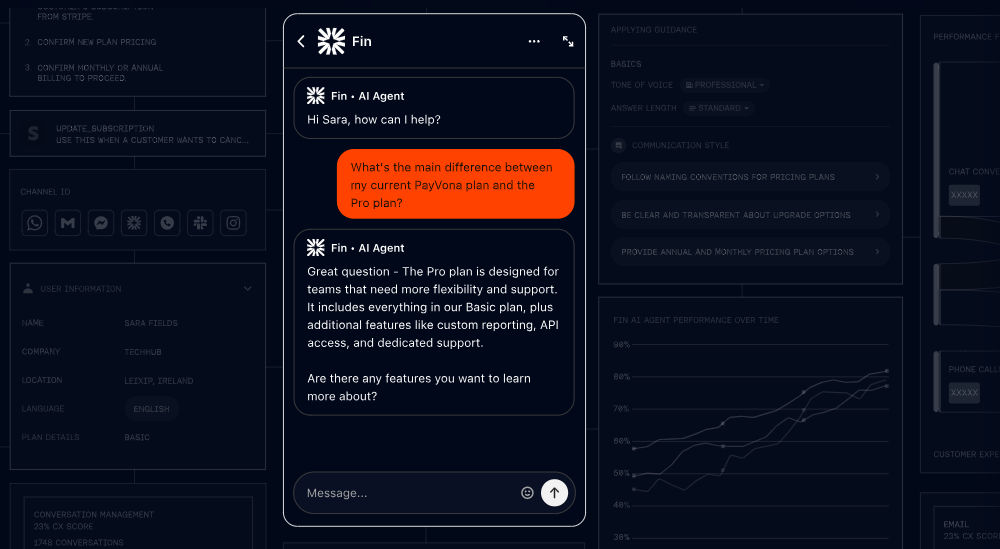
Lightspeed is a global commerce platform for retailers, restaurants, and hospitality businesses. By partnering with Intercom, they rolled out an AI Fin Agent that browsers their knowledge base and handles customer support by answering simple user questions like “How do I reset my password?”.
It’s not just a chatbot that pulls links to articles, but conversational AI ,which makes the customer support experience feel human and personalized.
For complex support cases, Fin passes all the information to a human, so the customer doesn’t need to repeat anything. On the employee side, AI Copilot backs support agents by suggesting helpful replies, pulling in relevant knowledge base content and speeding up onboarding for new team members.
How AI Impacts Customer Support
With the help of AI, Lightspeed processes up to 65% of customer conversations automatically. Their agents close 31% more conversations daily with the help of AI.
5. Allina Health: AI For Patient Engagement
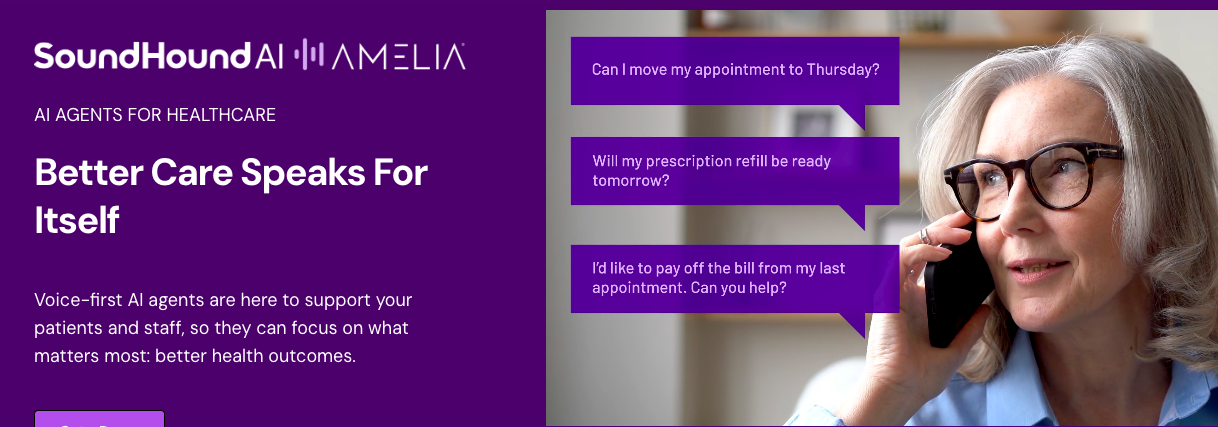
Allina Health, a nonprofit healthcare provider, recently launched “Alli,” an AI-powered voice agent that automates call center operations. Alli integrates with Allina’s EMR to instantly identify and authenticate callers.
Patients can now manage appointments and, in the future, refill prescriptions, locate providers, and get answers to non-clinical questions. All without waiting on hold. The AI voice agent reduces call center workload and gives patients faster, more convenient access to services.
How AI Impacts Patient and Staff Experience
Since the launch, Alli has helped Allina Health achieve faster average call times and resolve 80% of incoming calls in under 45 seconds, without adding staff. By handling routine tasks like identity verification and scheduling, the AI agent lets support representatives focus on complex and sensitive patient needs.
6. CVS Health: AI-Powered Vaccine Scheduling
In response to the 2021 COVID-19 vaccine rollout, CVS Health launched an AI-powered vaccine scheduling service. It simplifies and digitizes the check-in process for patients looking for immunization and vaccination. Intelligent vaccine scheduling software automates self-service appointments, routes patients to the nearest location and suggests the optimal time slots based on your capacity.
How AI Impacts Patient Scheduling
AI makes patient scheduling more accessible and convenient by going online and paperless. Nearly 80% of patients adopted this capability and are actively using it according to CVS Health report.
7. Arizona State University: AI Chatbot for Student Engagement
Arizona State University’s AI chatbot, Sunny, uses a knowledge base to answer students’ and parents’ questions. Launched in 2019, Sunny handles student questions around admissions, class registration, financial aid, and more. About 5,900 students engaged with Sunny to inquire about their classes and remote alternatives to ASU services in March 2020 during the peak of the pandemic.
How AI Impacts Student Engagement
AI not only cuts down the administrative workload for universities but also drives student engagement. Among AI experience examples are smart educational scheduling software, personalized notifications about upcoming deadlines, and campus events. Students enjoy 24/7 informational assistance and a better onboarding experience.
8. U.S. Department of Veterans Affairs: AI for Appointment Support
In the public service sector, AI can automate government appointment scheduling, community engagement and public service delivery.
An example, The U.S. Department of Veterans Affairs deployed an AI assistant VA chat. With this, veterans can book appointments, navigate claim statuses, and access benefits via chatbot. The solution uses Dialogflow and NLP to understand context-sensitive inquiries and guide users accurately.
How AI Impacts Public Service
AI improves public service experiences by making information more accessible and reducing wait times.
9. Sephora: AI for Product Choice and Appointment Booking

Sephrora delivers one of the best AI customer experience examples with its Virtual Assistant. It uses AI to recommend best-fit makeup products based on your previous interactions and purchased items. Moreover, you can book beauty appointments in-store via chat or online platform. It’s an excellent example of how a retail brand can blend AI into its omnichannel customer experience.
Sephora’s Reservation Assistant helps customers find beauty products, book in-store beauty consultations, find available time slots and nearby store locations. No back-and-forth needed. Launched via Facebook Messenger, in under 2 years, it increased booking rates by 11% — leading to happier customers and higher in-store spending.
How AI Impacts Customer Experience in Retail
If your goal is to increase foot traffic and create more meaningful online customer interactions, SUMO’s AI-driven retail scheduling software provides a simple way to scale in-store visits.
10. Crisis Text Line: AI for Mental Health Support
Crisis Text Line is one of the world’s most prominent mental health support lines offering free, 24/7 support. Their AI chat scans incoming text messages in real time with NLP and machine learning models. Then, it detect patterns linked to suicide, self-harm, or severe distress.
AI flags these messages for immediate human intervention and also helps counselors by suggesting potential next responses based on successful outcomes from past chats.
How AI Impacts Nonprofits
Thanks to AI, Crisis Text Line reduced their response time for high-risk texters from 2 min to within 39 seconds. The system ensures that limited human resources are focused where they’re needed most.
Summing Up
Each of these AI customer experience examples isn’t just about automation—they’re about relevance, personalization, and scale. Whether you’re closing a deal or resolving a support issue, AI streamlines the process. You can automate routine tasks and access the right information at the right time.
And if you’re looking to bring the same kind of AI-driven efficiency to your own business, SUMO Scheduler is built to help you engage customers faster and smarter.

